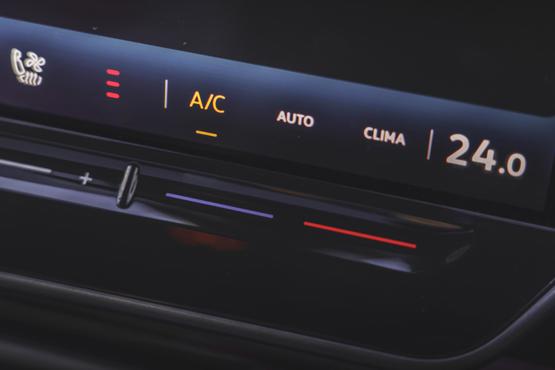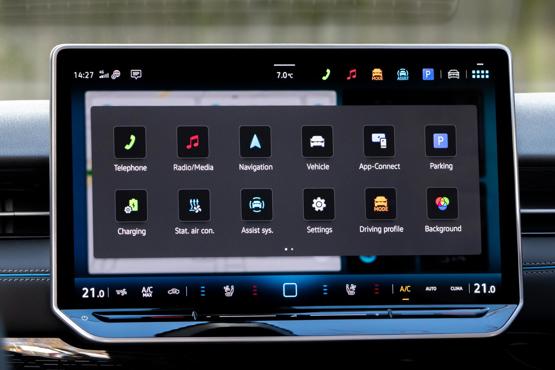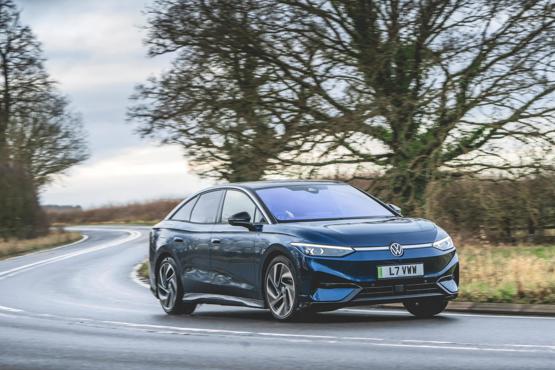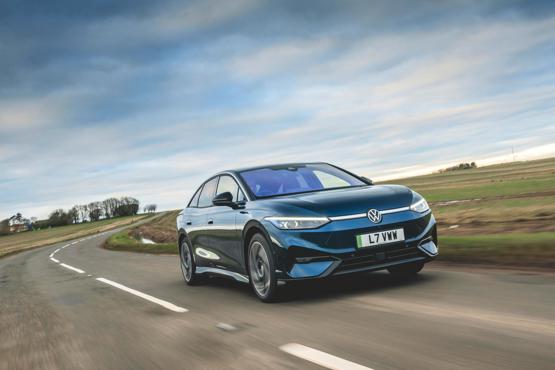If you’re looking for a large, comfortable and cost effective electric car, the ID 7 could be the ideal candidate. It’s spacious, easy to drive and well-equipped, while offering a higher level of quality than other models in the ID range. The styling and drivability are a little on the bland side, however.
Overview
The ID 7 is Volkswagen’s largest ID car to date and it marks a resurgence of the ailing upper-medium sector, where cars like the Ford Mondeo, Vauxhall Insignia and VW Passat were once company car kings.
While most drivers made the switch to SUVs, a large hatchback or saloon body actually bodes much better when you consider an electric powertrain, thanks to improved aerodynamics.
VW refers to the ID 7 as a Fastback. It looks like a saloon but the tailgate is actually a hatch, making the car much more practical. It’s most closely aligned with the Arteon in VW’s current line-up.
Styling is less daring than VW’s other ID models, which may prove to be the car’s downfall as it fails to stand out against more eye-catching rivals.
With a similar footprint to the BMW i5 and Mercedes EQE, it is priced at around £20,000 less. At almost five meters in length, the ID 7 is a fair bit larger than cars like the Hyundai Ioniq 5 and Kia EV6.
It means drivers that were used to a car in the £50,000 price bracket can now access a large electric model where they couldn’t previously.
The ID 7 Pro Match is priced from £51,550. It comes with a 77kWh battery and a 286PS electric motor. More versions, including a twin-motor GTX, and an estate are due to launch later this year.
Comfort and practicality
VW was keen to overcome early criticisms of its electric cars with its new flagship and one of those was cabin quality. In the ID 7 its clear that a conscious effort has been made to uplift the interior with premium materials and improved build quality.
The cabin retains a digital-first approach, with VW’s familiar floating touchscreen taking the place of conventional switchgear. A key change for the ID 7 is that the touch sensitive ‘sliders’ – used for adjusting the volume and cabin temperature – are now illuminated.

The ID 7 is an extremely spacious car, with ample room on board for five adults to travel comfortably. It benefits from ergoActive front seats, which have a massage function and have been certified by the German Campaign for Healthier Backs (AGR).
A minimalist dashboard design helps to create a greater sense of space up front, where the seats are separated by a centre console with a wide armrest and large covered storage tray.
The gear shifter is mounted to the right of the steering wheel, freeing up more space between the front seats. It does, however, mean the wiper controls are integrated into the indicator stalk, Mercedes-style.
In the boot it’s equally spacious. The electrically-operated tailgate hides a 532-litre space, which can be expanded to more than 1,500 litres by folding the rear seats. From a practicality perspective, the ID 7 can do everything a mid-size SUV can.
Safety and technology
The ID 7’s 15-inch touchscreen is powered by a brand-new operating system, which offers a greater degree of customisation and promises to be more reliable than VW’s existing system. The system is easy to use, with a simplified tile-based layout and a crisp high-resolution display.
Key functions are accessible at all times, via a row of icons at the top and bottom of the display. There’s also a new voice assistant, named IDA, which has been programmed to respond to natural speech. It can access the internet to find answers to questions, as well as controlling car functions such as the climate control and navigation.

Along with its enhanced infotainment, the ID 7 is also equipped with VW’s latest driver aids. These include adaptive cruise control, lane keep assist and blind spot monitoring. It also has a degree of autonomy, thanks to Travel Assist which facilitates lane changing on the motorway, as well as an automatic parking system that can memorise and replicate specific manoeuvres, such as parking in a garage.
Drivability and range
Powering the ID 7 is VW’s newly-designed 286PS motor, which was developed with efficiency in mind. When paired with the car’s 77kWh battery, a range of 380 miles is promised.
It’s the only powertrain available, currently, but a more powerful twin motor version is on the cards, plus a model with a larger battery that has a range of more than 400 miles.
While the prospect of a rear-wheel-drive saloon with 286PS would have once been an exciting prospect, the ID 7 offers a much more relaxing drive than its power figures suggest. It’s not sluggish car, with 545Nm of torque it provides effortless progress that can soon activate the speed limit warning alarm. But VW’s throttle mapping is extremely conservative, and the power delivery always feels linear.
More impressive is the car’s efficiency. On a cold, wet morning, a relatively brisk drive returned 3.0mi/kWh. Other similar sized cars get closer to 2.0mi/kWh in similar circumstances. VW’s promise of 380 miles (WLTP) may be a little off the mark, but we’d easily expect more than 300 on a warm day and at least 250 in the cold.

The ID 7 is available with adaptive dampers as an option, which give drivers the ability to firm up the suspension for a sportier drive. While the ID 7 isn’t the most dynamically finessed car on the road, it does handle well. When the GTX version arrives, it may suit keener drivers.
Our only criticism of the drive is the brake feel, which is quite weak for the first half of the pedal travel. Combined with the car’s ability to hide its speed, it means that you often find yourself approaching roundabouts and having a slight panic that it’s not going to stop in time.
Company car tax and running costs
The ID 7 represents good value for money when compared to its pool of rivals. It might not have the performance, handling and luxury to match the BMW i5, but when it comes to range – the thing that drivers really care about – it’s very competitive. With a P11d of some £20,000 less than the BMW’s, the ID 7 will be far more accessible to drivers that would usually take a car like a 5 Series.
Based on the Launch Edition specification, priced at £55,515, the ID 7 will cost drivers £18.50 per month in company car tax (20% taxpayer). It has a projected running cost of 67p per mile, which is about 14ppm less than an i5 eDrive40.

